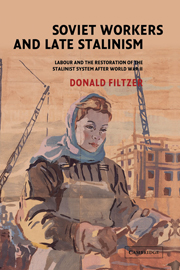 Soviet Workers and Late Stalinism
Soviet Workers and Late Stalinism Book contents
- Frontmatter
- Contents
- List of tables
- Preface and acknowledgements
- List of terms and abbreviations
- Introduction: the political imperatives of the postwar recovery
- 1 Rebuilding the workforce: free, slave, and indentured labour
- 2 The food crisis of 1946–1947
- 3 Attenuated recovery: the end of rationing, housing, and health
- 4 ‘Socializing’ the next generation: the position of young workers
- 5 Labour discipline and criminal law: the futility of repression
- 6 The industrial enterprise: working conditions, work organization, and wage determination
- Conclusion: labour and the ‘renormalization’ of Stalinist social relations
- Bibliography
- Index
Preface and acknowledgements
Published online by Cambridge University Press: 07 August 2009
- Frontmatter
- Contents
- List of tables
- Preface and acknowledgements
- List of terms and abbreviations
- Introduction: the political imperatives of the postwar recovery
- 1 Rebuilding the workforce: free, slave, and indentured labour
- 2 The food crisis of 1946–1947
- 3 Attenuated recovery: the end of rationing, housing, and health
- 4 ‘Socializing’ the next generation: the position of young workers
- 5 Labour discipline and criminal law: the futility of repression
- 6 The industrial enterprise: working conditions, work organization, and wage determination
- Conclusion: labour and the ‘renormalization’ of Stalinist social relations
- Bibliography
- Index
Summary
Every idea for a book has a particular genesis, and the genesis of this one lies in a monumental stupidity. When I first began to teach Soviet history, and for quite a few years thereafter, I was somehow possessed of the insane notion that the USSR's experience during World War II was essentially of military importance, and that the political and social history of the period were relatively uninteresting. I therefore used to race through this part of the syllabus as quickly as possible. I knew from standard texts, of course, that the war had seen a number of changes in state policy, for example, a tacit toleration of semi-private trade in agriculture and a rapprochement with the Orthodox Church, but I nevertheless managed to keep such inconvenient pieces of information from challenging my basic prejudices. Yet deep down inside I knew there was something not quite right with this interpretation. When I had read K. S. Karol's autobiography, Solik, I remember marvelling at his descriptions of the way in which soldiers separated from their units or whose companies had been destroyed or dispersed in battle wandered more or less freely around the country seeking another military unit to which they could attach themselves. Films about the war made in the Khrushchev and Brezhnev years painted a similar picture of a population over which the state – the Stalinist police state – was exercising surprisingly little control during a time of dire national emergency.
- Type
- Chapter
- Information
- Soviet Workers and Late StalinismLabour and the Restoration of the Stalinist System after World War II, pp. x - xvPublisher: Cambridge University PressPrint publication year: 2002


